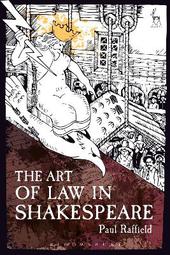
|
The Art of Law in Shakespeare
Hardback
Main Details
| Title |
The Art of Law in Shakespeare
|
| Authors and Contributors |
By (author) Paul Raffield
|
| Physical Properties |
| Format:Hardback | | Pages:312 | | Dimensions(mm): Height 234,Width 156 |
|
| Category/Genre | Literary studies - c 1500 to c 1800 |
|---|
| ISBN/Barcode |
9781509905478
|
| Classifications | Dewey:822.33 |
|---|
| Audience | | Tertiary Education (US: College) | |
|---|
|
Publishing Details |
| Publisher |
Bloomsbury Publishing PLC
|
| Imprint |
Hart Publishing
|
| Publication Date |
9 February 2017 |
| Publication Country |
United Kingdom
|
Description
Through an examination of five plays by Shakespeare, Paul Raffield analyses the contiguous development of common law and poetic drama during the first decade of Jacobean rule. The broad premise of The Art of Law in Shakespeare is that the 'artificial reason' of law was a complex art form that shared the same rhetorical strategy as the plays of Shakespeare. Common law and Shakespearean drama of this period employed various aesthetic devices to capture the imagination and the emotional attachment of their respective audiences. Common law of the Jacobean era, as spoken in the law courts, learnt at the Inns of Court and recorded in the law reports, used imagery that would have been familiar to audiences of Shakespeare's plays. In its juridical form, English law was intrinsically dramatic, its adversarial mode of expression being founded on an agonistic model. Conversely, Shakespeare borrowed from the common law some of its most critical themes: justice, legitimacy, sovereignty, community, fairness, and (above all else) humanity. Each chapter investigates a particular aspect of the common law, seen through the lens of a specific play by Shakespeare. Topics include the unprecedented significance of rhetorical skills to the practice and learning of common law (Love's Labour's Lost); the early modern treason trial as exemplar of the theatre of law (Macbeth); the art of law as the legitimate distillation of the law of nature (The Winter's Tale); the efforts of common lawyers to create an image of nationhood from both classical and Judeo-Christian mythography (Cymbeline); and the theatrical device of the island as microcosm of the Jacobean state and the project of imperial expansion (The Tempest).
Author Biography
Paul Raffield is Professor of Law at The University of Warwick, where he teaches Shakespeare and the Law, Origins of English Law, and Tort Law. He is the author of Shakespeare's Imaginary Constitution: Late Elizabethan Politics and the Theatre of Law (Oxford, Hart Publishing, 2010) and Images and Cultures of Law in Early Modern England: Justice and Political Power, 1558-1660 (Cambridge, Cambridge University Press, 2004). He is co-founder and consultant editor of the journal Law and Humanities.
Reviews[T]he book ... furnishes a wealth of information and insight for students of Shakespeare and of the history of British law alike. It provides ample proof that the kind of detailed scrutiny which is offered here can bring to light so much more in the exciting contact zone between law and literature in Elizabethan and Jacobean times which comprises the stage and the law courts and legal institutions alike. -- Klaus Stierstorfer * Anglistik * Shakespeare's relationship with Law may be well established, but Paul Raffield demonstrates its richness and variety in The Art of Law in Shakespeare. -- Rachel E Holmes, University of Cambridge * The Review of English Studies * [T]he discussions are worth the work required of the reader, and the extended treatment of the legal cases, and especially Sir Edward Coke's writings, are valuable. -- Kelly Stage, University of Nebraska-Lincoln * Renaissance Quarterly *
|